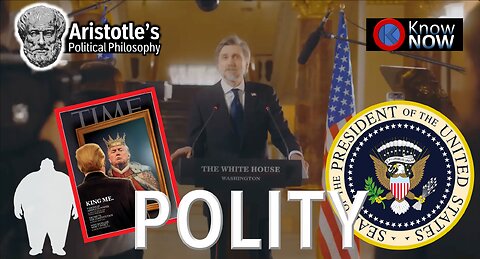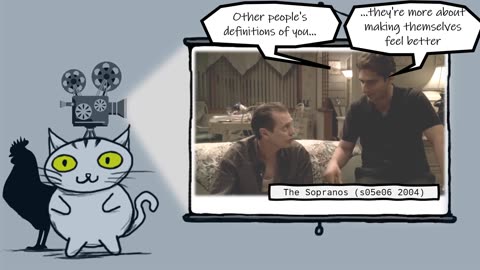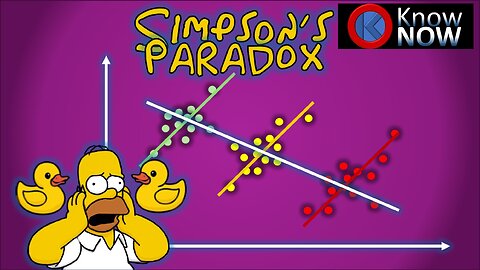-
Kitchen Bacteria 5 facts - From Sponges to Cutting Boards
 KNOW NOWThis video reveals surprising truths about common household hygiene misconceptions. It highlights how everyday items like kitchen sponges, phone screens, and cutting boards can harbor more bacteria than public toilets or doorknobs. For example, sponges are bacterial hotspots but can be sanitized by microwaving (as long as there's no metal). The video also warns about restaurant ice machines and encourages viewers to rethink what “clean” really means. With a mix of humor and practical advice, it urges viewers to stay curious, clean, and healthy. Watch on YouTube: https://youtu.be/3FmxE0qlFxU22 views 1 comment
KNOW NOWThis video reveals surprising truths about common household hygiene misconceptions. It highlights how everyday items like kitchen sponges, phone screens, and cutting boards can harbor more bacteria than public toilets or doorknobs. For example, sponges are bacterial hotspots but can be sanitized by microwaving (as long as there's no metal). The video also warns about restaurant ice machines and encourages viewers to rethink what “clean” really means. With a mix of humor and practical advice, it urges viewers to stay curious, clean, and healthy. Watch on YouTube: https://youtu.be/3FmxE0qlFxU22 views 1 comment -
The Dairy Diary - Chapter 1: Milk Introduction
 KNOW NOWVideo by KNOW (KnowNow) Let’s talk Milk! Milk — it’s more than just a drink. It’s a powerhouse of nutrition, a global staple, and a key player in feeding our growing world. In this video series, we’ll explore what makes milk so special, how it supports our health, and learn more about everything around milk. In this first episode, let’s introduce the milk, where it comes from, and what it’s made of! 00:00 Introduction 00:30 What is Milk 00:50 Where Milk Comes From 01:16 Nutritional Qualities 01:42 Milks Comparison 01:53 Casein Protein 02:22 Lactose 03:34 Ash 04:28 Whey Protein 05:26 Whey vs Casein 05:37 Future Outlook Watch on YouTube: https://youtu.be/tGxrsP7P2lA57 views
KNOW NOWVideo by KNOW (KnowNow) Let’s talk Milk! Milk — it’s more than just a drink. It’s a powerhouse of nutrition, a global staple, and a key player in feeding our growing world. In this video series, we’ll explore what makes milk so special, how it supports our health, and learn more about everything around milk. In this first episode, let’s introduce the milk, where it comes from, and what it’s made of! 00:00 Introduction 00:30 What is Milk 00:50 Where Milk Comes From 01:16 Nutritional Qualities 01:42 Milks Comparison 01:53 Casein Protein 02:22 Lactose 03:34 Ash 04:28 Whey Protein 05:26 Whey vs Casein 05:37 Future Outlook Watch on YouTube: https://youtu.be/tGxrsP7P2lA57 views -
Objective Reality - an Asymptotic Measure of Reliability of Existence?
 KNOW NOWVideo by KNOW (KnowNow). Objective Reality: Does It Truly Exist? The concept of “objectivity” has long been central to philosophy and science, often defined as that which exists independent of perception. We are thought to assume that “reality” exists independently of our perception, i.e. that things “objectively exist”. We refer to them often as “facts”. Upon closer examination, the definition of “objective reality” presents several challenges. If all knowledge is filtered through perception, how can we ever claim something is truly independent of it? Furthermore, if objectivity is merely the sum of subjective observations, does it become nothing more than an accepted consensus rather than an independent truth? In this video, we will explore these questions, ultimately considering whether objective reality exists at all or if it is merely an asymptotic concept—one that can be approached but never fully attained. Defining Objectivity: Independence vs. Consensus A traditional definition of objectivity posits that it refers to something that exists independent of perception. This seems to suggest that even if no one were present to observe it, an objective fact would remain true. A tree may fall in the forest and make sound, even if no one is there to see it or hear it. However, this immediately leads to a paradox: how can we know that something exists outside of perception when all knowledge is derived from the perception, including the very same idea we have about it? If we attempt to define objectivity in terms of consensus — meaning something is objective if it is reliably confirmed by multiple observers (in science we call it “accepted as true”) — then we run into another issue. Consensus is still built on individual subjective experiences. Just because a majority agrees on something does not make it fundamentally independent of perception, as future observations may contradict prior beliefs. For instance, if the entire world agreed that a particular painting was beautiful, that would not make the beauty of that painting an objective fact; it would simply reflect a widely held subjective opinion. There still may be that one guy who will not find it beautiful. Even if we interview all people in the world, there still could be someone in the future. Or maybe someone lied? They lied under peer pressure but did not really find the painting beautiful. This suggests that defining objectivity as merely intersubjective agreement is flawed. Instead, we must look for a definition that avoids reliance on both individual perception and collective agreement. Objectivity as an Asymptotic Measure of Reliability A more refined approach to objectivity might involve reliability rather than absolute independence. That is, something is "objective" not because it exists apart from perception but because it demonstrates consistent patterns across independent observations. The key here is repeatability: if a phenomenon can be measured and produces the same results under the same conditions, it becomes more “reliable” and, thus, “more objectively valid”. However, “reliability” is not a binary concept—it exists on a continuum. The more consistently something can be verified, the closer it comes to what we might call "true objectivity." In this way, objectivity is best understood as an asymptotic concept: a theoretical limit we can approach but never reach with absolute certainty. Science itself operates under this principle. Newton's laws of motion, for instance, were once considered objective truths, yet they were later refined by Einstein’s theory of relativity. Scientific knowledge becomes increasingly reliable over time, but it never reaches a final, absolute state. The Case of Zero and Infinity: Do They Exist? This approach to objectivity bears an interesting resemblance to mathematical concepts like zero and infinity. Neither zero nor infinity exist in a tangible sense; they are ideas that help us describe reality rather than things that have independent existence. Zero represents the absence of quantity, but there is no physical "zero" in nature. Similarly, infinity is not a place or object but a limit—something that can be approached conceptually but never fully grasped in a finite system. If we accept that zero and infinity do not "exist" in a traditional sense but are still useful constructs, then the same logic might apply to objective reality. Perhaps objectivity does not exist as a literal, independent state but rather as a conceptual framework that allows us to make sense of the world. It is not something we discover in a pure form but something we define through repeated observation and refinement. Conclusion: Is Objective Reality a Useful Fiction?22 views
KNOW NOWVideo by KNOW (KnowNow). Objective Reality: Does It Truly Exist? The concept of “objectivity” has long been central to philosophy and science, often defined as that which exists independent of perception. We are thought to assume that “reality” exists independently of our perception, i.e. that things “objectively exist”. We refer to them often as “facts”. Upon closer examination, the definition of “objective reality” presents several challenges. If all knowledge is filtered through perception, how can we ever claim something is truly independent of it? Furthermore, if objectivity is merely the sum of subjective observations, does it become nothing more than an accepted consensus rather than an independent truth? In this video, we will explore these questions, ultimately considering whether objective reality exists at all or if it is merely an asymptotic concept—one that can be approached but never fully attained. Defining Objectivity: Independence vs. Consensus A traditional definition of objectivity posits that it refers to something that exists independent of perception. This seems to suggest that even if no one were present to observe it, an objective fact would remain true. A tree may fall in the forest and make sound, even if no one is there to see it or hear it. However, this immediately leads to a paradox: how can we know that something exists outside of perception when all knowledge is derived from the perception, including the very same idea we have about it? If we attempt to define objectivity in terms of consensus — meaning something is objective if it is reliably confirmed by multiple observers (in science we call it “accepted as true”) — then we run into another issue. Consensus is still built on individual subjective experiences. Just because a majority agrees on something does not make it fundamentally independent of perception, as future observations may contradict prior beliefs. For instance, if the entire world agreed that a particular painting was beautiful, that would not make the beauty of that painting an objective fact; it would simply reflect a widely held subjective opinion. There still may be that one guy who will not find it beautiful. Even if we interview all people in the world, there still could be someone in the future. Or maybe someone lied? They lied under peer pressure but did not really find the painting beautiful. This suggests that defining objectivity as merely intersubjective agreement is flawed. Instead, we must look for a definition that avoids reliance on both individual perception and collective agreement. Objectivity as an Asymptotic Measure of Reliability A more refined approach to objectivity might involve reliability rather than absolute independence. That is, something is "objective" not because it exists apart from perception but because it demonstrates consistent patterns across independent observations. The key here is repeatability: if a phenomenon can be measured and produces the same results under the same conditions, it becomes more “reliable” and, thus, “more objectively valid”. However, “reliability” is not a binary concept—it exists on a continuum. The more consistently something can be verified, the closer it comes to what we might call "true objectivity." In this way, objectivity is best understood as an asymptotic concept: a theoretical limit we can approach but never reach with absolute certainty. Science itself operates under this principle. Newton's laws of motion, for instance, were once considered objective truths, yet they were later refined by Einstein’s theory of relativity. Scientific knowledge becomes increasingly reliable over time, but it never reaches a final, absolute state. The Case of Zero and Infinity: Do They Exist? This approach to objectivity bears an interesting resemblance to mathematical concepts like zero and infinity. Neither zero nor infinity exist in a tangible sense; they are ideas that help us describe reality rather than things that have independent existence. Zero represents the absence of quantity, but there is no physical "zero" in nature. Similarly, infinity is not a place or object but a limit—something that can be approached conceptually but never fully grasped in a finite system. If we accept that zero and infinity do not "exist" in a traditional sense but are still useful constructs, then the same logic might apply to objective reality. Perhaps objectivity does not exist as a literal, independent state but rather as a conceptual framework that allows us to make sense of the world. It is not something we discover in a pure form but something we define through repeated observation and refinement. Conclusion: Is Objective Reality a Useful Fiction?22 views -
Mlinci - The Taste of Tradition
 KNOW NOWVideo by KNOW (KnowNow) In the heart of the Croatian countryside, brimming with rolling hills and lush vineyards, lays the county of Zagorje. Here, time seemed to stand still, and the air was filled with the scent of blooming wildflowers and the distant hum of bees. It was a place where traditions were cherished, and every meal told a story. Let's talk "Mlinci"! Watch on YouTube: https://youtu.be/XHI4p-FNfGc24 views
KNOW NOWVideo by KNOW (KnowNow) In the heart of the Croatian countryside, brimming with rolling hills and lush vineyards, lays the county of Zagorje. Here, time seemed to stand still, and the air was filled with the scent of blooming wildflowers and the distant hum of bees. It was a place where traditions were cherished, and every meal told a story. Let's talk "Mlinci"! Watch on YouTube: https://youtu.be/XHI4p-FNfGc24 views -
The Neuron - Part 1: Basic Anatomy and Function (incl. The Synapse)
 KNOW NOWVideo by KNOW (KnowNow). Neurons, or nerve cells, carry out the functions of the nervous system by conducting nerve impulses. They are highly specialized and amitotic. This means that if a neuron is destroyed, it cannot be replaced because neurons do not go through mitosis. There are some exceptions, though, such as neural stem cells and progenitor cells in certain regions of the brain, like the hippocampus, where neurogenesis (creation of new neurons) is possible. In this video, we focus on neuron basics. The video ends with the explanation of the synapse. A synapse is the junction between two neurons, or between a neuron and another cell, such as a muscle or gland cell, where communication occurs.33 views 1 comment
KNOW NOWVideo by KNOW (KnowNow). Neurons, or nerve cells, carry out the functions of the nervous system by conducting nerve impulses. They are highly specialized and amitotic. This means that if a neuron is destroyed, it cannot be replaced because neurons do not go through mitosis. There are some exceptions, though, such as neural stem cells and progenitor cells in certain regions of the brain, like the hippocampus, where neurogenesis (creation of new neurons) is possible. In this video, we focus on neuron basics. The video ends with the explanation of the synapse. A synapse is the junction between two neurons, or between a neuron and another cell, such as a muscle or gland cell, where communication occurs.33 views 1 comment -
Birthday Paradox - Probability of shared birthdays
 KNOW NOWVideo by KNOW (KnowNow). The birthday paradox is a famous problem in probability theory that seems counterintuitive at first. It states that in a group of just 23 people, there's a better than even chance (over 50%) that at least two people share the same birthday. It's a surprising result because our intuition often tells us that we would need a much larger group for a shared birthday to be likely.19 views
KNOW NOWVideo by KNOW (KnowNow). The birthday paradox is a famous problem in probability theory that seems counterintuitive at first. It states that in a group of just 23 people, there's a better than even chance (over 50%) that at least two people share the same birthday. It's a surprising result because our intuition often tells us that we would need a much larger group for a shared birthday to be likely.19 views -
The Longest Word in English
 KNOW NOWVideo by KNOW (KnowNow). Have you ever wondered what the longest word in English is? Well, get ready, because today we’re diving into some ridiculously long words—some real, some a bit silly, and one that’s just… too long to say! Explore YouTube or Rumble for people trying to do it. There are over 2 hour long videos of people saying this one long word. And then there are many more than what we showcased here. Explore! What about long words in other languages? YouTube link: https://youtu.be/IAayRgTDUBQ16 views
KNOW NOWVideo by KNOW (KnowNow). Have you ever wondered what the longest word in English is? Well, get ready, because today we’re diving into some ridiculously long words—some real, some a bit silly, and one that’s just… too long to say! Explore YouTube or Rumble for people trying to do it. There are over 2 hour long videos of people saying this one long word. And then there are many more than what we showcased here. Explore! What about long words in other languages? YouTube link: https://youtu.be/IAayRgTDUBQ16 views -
Aristotle's Polity: A Quest for Perfect Balance of Power in Government
 KNOW NOWVideo by KNOW (KnowNow). As we navigate the complexities of the twenty-first century, Aristotle's concept of polity remains remarkably relevant. In an era marked by increasing polarization, political gridlock, and the rise of populism, the need for balanced, inclusive governance has never been greater. The challenges we face—from climate change to economic inequality to global pandemics—demand collaborative solutions that reflect the needs and aspirations of all members of society. Polity, with its emphasis on finding common ground, fostering dialogue, and balancing competing interests, offers a timeless framework for addressing these challenges. By learning from both the successes and failures of past attempts to create a polity, we can strive to build more just, equitable, and prosperous societies for ourselves and for generations to come. YouTube link: https://youtu.be/GYCXnr7JzWs15 views
KNOW NOWVideo by KNOW (KnowNow). As we navigate the complexities of the twenty-first century, Aristotle's concept of polity remains remarkably relevant. In an era marked by increasing polarization, political gridlock, and the rise of populism, the need for balanced, inclusive governance has never been greater. The challenges we face—from climate change to economic inequality to global pandemics—demand collaborative solutions that reflect the needs and aspirations of all members of society. Polity, with its emphasis on finding common ground, fostering dialogue, and balancing competing interests, offers a timeless framework for addressing these challenges. By learning from both the successes and failures of past attempts to create a polity, we can strive to build more just, equitable, and prosperous societies for ourselves and for generations to come. YouTube link: https://youtu.be/GYCXnr7JzWs15 views -
Projection: Why and How It Works (short version)
 KNOW NOWProjection is a psychological defense mechanism where individuals attribute their own unwanted thoughts, feelings, or motives to others. This concept, first introduced by Sigmund Freud, plays a significant role in both individual psychology and broader social dynamics, including propaganda. This video explores the definition of projection, its underlying motivations, its use in personal and propaganda contexts, and the telltale signs to recognize it. For the full 20 min version with examples, please visit the friendly channel: "Cocky Cat with Big Black ** Rooster ** named Richard" YouTube: https://youtu.be/VCP4JpYb6j4 Rumble: Content: 00:00 Projection 00:37 Why Projection? 02:06 Examples 03:17 Conclusion YouTube link: https://youtu.be/U51uokZyNl8 Video by KNOW (KnowNow).20 views
KNOW NOWProjection is a psychological defense mechanism where individuals attribute their own unwanted thoughts, feelings, or motives to others. This concept, first introduced by Sigmund Freud, plays a significant role in both individual psychology and broader social dynamics, including propaganda. This video explores the definition of projection, its underlying motivations, its use in personal and propaganda contexts, and the telltale signs to recognize it. For the full 20 min version with examples, please visit the friendly channel: "Cocky Cat with Big Black ** Rooster ** named Richard" YouTube: https://youtu.be/VCP4JpYb6j4 Rumble: Content: 00:00 Projection 00:37 Why Projection? 02:06 Examples 03:17 Conclusion YouTube link: https://youtu.be/U51uokZyNl8 Video by KNOW (KnowNow).20 views -
Simpson's Paradox: When Data Deceives!
 KNOW NOWVideo by KNOW (KnowNow) The significance of data analysis and statistics is growing rapidly. Whether it's forecasting the weather, analyzing a company's declining sales, predicting future diplomatic relations between countries, or finding a match between persons on a dating website, vast datasets are being scrutinized to confirm insights. This method is undoubtedly the most objective approach. However, the question remains: Is your data leading you to accurate conclusions, or is there hidden bias? One fascinating statistical paradox is Simpson's Paradox, which can sometimes lead to incorrect conclusions. It occurs when a trend appears in several different groups of data but disappears or reverses when these groups are combined. Content: 00:00 Introduction 00:34 The Simpson's Paradox (Hidden Bias) 01:20 UC Berkeley Gender Bias Case 02:20 NAEP Case 03:15 Conclusion Video by KNOW (KnowNow)55 views
KNOW NOWVideo by KNOW (KnowNow) The significance of data analysis and statistics is growing rapidly. Whether it's forecasting the weather, analyzing a company's declining sales, predicting future diplomatic relations between countries, or finding a match between persons on a dating website, vast datasets are being scrutinized to confirm insights. This method is undoubtedly the most objective approach. However, the question remains: Is your data leading you to accurate conclusions, or is there hidden bias? One fascinating statistical paradox is Simpson's Paradox, which can sometimes lead to incorrect conclusions. It occurs when a trend appears in several different groups of data but disappears or reverses when these groups are combined. Content: 00:00 Introduction 00:34 The Simpson's Paradox (Hidden Bias) 01:20 UC Berkeley Gender Bias Case 02:20 NAEP Case 03:15 Conclusion Video by KNOW (KnowNow)55 views









